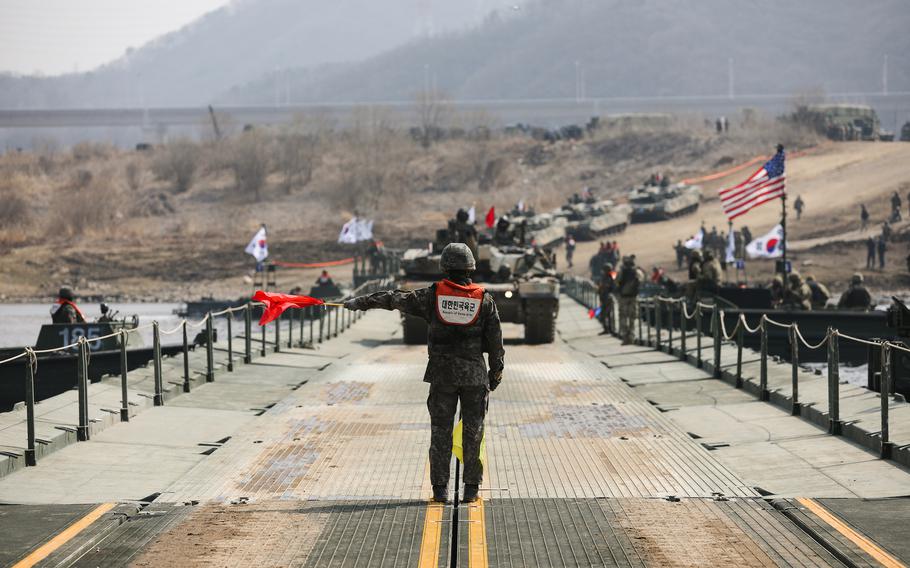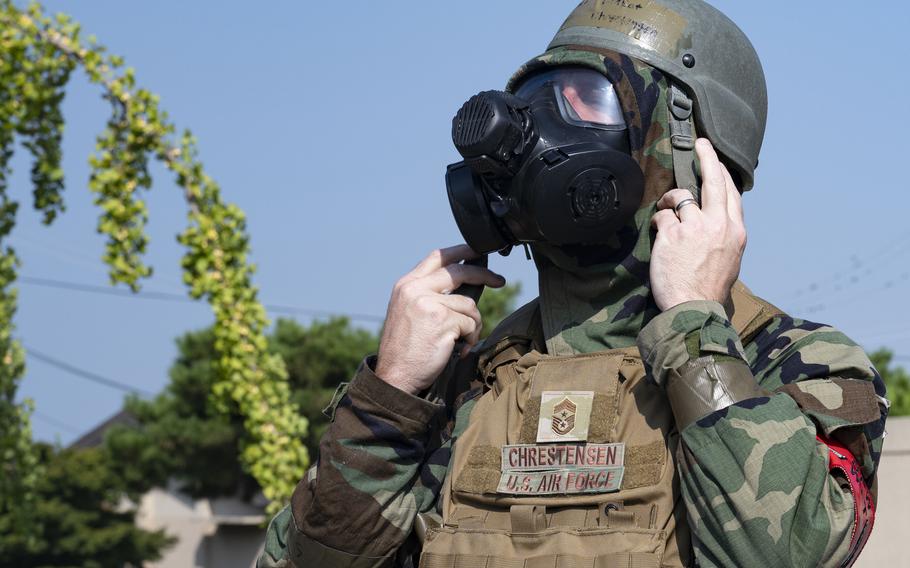
A South Korean soldier guides tanks onto a bridge erection boat as part of the Freedom Shield exercise on the Korean Peninsula, March 20, 2025. (Oniel McDonald/U.S. Army)
SEOUL, South Korea — A blistering heat wave sweeping across the Korean Peninsula has forced the U.S. and South Korean militaries to postpone half of their field training drills this month, scaling back one of their largest annual joint exercises, spokesmen for both countries said Thursday.
Ulchi Freedom Shield — the second of two major joint exercises held each year — is scheduled to take place Aug. 18-28, said U.S. Forces Korea spokesman Army Col. Ryan Donald and South Korean Joint Chiefs of Staff spokesman army Col. Lee Sung Joon.
The announcement was made during a news conference at the Ministry of National Defense in Seoul.
Of the 40 planned field training drills, half have been postponed to next month due to extreme heat, Lee said. Drills involving computer simulations and overseas U.S. military assets will proceed as planned this month, he added.
Postponing some training will allow the militaries to maintain combat readiness without prioritizing deadlines over safety, Lee said.
August is typically the hottest month in South Korea. Last month was the country’s second-hottest July since 1973, with an average temperature of 80.7 degrees Fahrenheit, according to the Korea Meteorological Administration.

U.S. Air Force Chief Master Sgt. Nathan Chrestensen puts on protective gear during an Ulchi Freedom Shield drill at Kunsan Air Base, South Korea, Aug. 20, 2024. (Nicholas Ross/U.S. Air Force)
Since May 20, at least 20 heat-related deaths have been reported, and approximately 3,300 people have been treated in hospital emergency rooms for heat-related illnesses, the Korea Disease Control and Prevention Agency said Wednesday.
Around 18,000 South Korean troops are expected to participate in Ulchi Freedom Shield, down from 19,000 last year, Lee said. The number of U.S. troops will be “similar to past” exercises, Donald added. USFK does not publicly release troop figures due to operational security concerns.
“Every [exercise] is different” and addresses evolving threats on the modern-day battlefield, Donald said.
The joint drills, which will take place across land, air, sea, space and cyberspace, will include scenarios informed by the wars in Ukraine and between Israel and Iran, he said.
“What’s important to remember is the quality of the training that will occur … because what this does is build our readiness and strengthens our posture to defend [South Korea] against any threat or any adversary,” Donald said.
Lee and Donald characterized the exercise as routine and defensive, a position North Korea does not share. Pyongyang routinely denounces joint drills. North Korean leader Kim Jong Un has previously ordered concurrent military exercises in response.
On March 10, the North launched an unspecified number of ballistic missiles off its western coast, coinciding with the start of Freedom Shield, the other large U.S.-South Korean exercise, according to the South’s Joint Chiefs of Staff.
Pyongyang has no interest in pursuing diplomatic talks with Seoul and attempts to reconcile their differences will be rejected, Kim Yo Jong, the leader’s sister, said in a statement published by the state-run Korean Central News Agency on July 28.